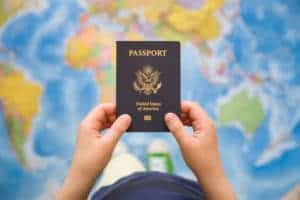Safety is a top priority for every global nomad, but often even more so if you identify as LGBTQ+. It’s important to keep in mind that a country’s attitude towards the LGBTQ+ community is extremely important and should factor into your decision to become an expatriate in that country. Experiences for LGBTQ+ global citizens vary globally, so you must have a solid understanding of where you plan to live in order for your time there to be safe and enjoyable.
Tips for LGBTQ Expatriates Living Abroad
We have developed the following top 10 tips as a resource to help LGBTQ+ expats find the necessary information they need to help them feel comfortable when considering options to live abroad.

1) Research LGBTQ+ Laws Beforehand
Traveling can be stressful for anyone but if you’re LGBTQ+ you also have to learn how to navigate other people’s prejudices safely. Unfortunately, there are still approximately 70 countries around the world where homosexuality is still outlawed which means it’s crucial that you educate yourself about local laws before you arrive. Every day, more and more countries are opening their minds to alternative lifestyles than ever before. On a positive note, many countries have also legalized same-sex marriage or at least passed legislation that protects LGBTQ+ travelers in their quest to become global citizens.
Each year, the International Lesbian, Gay, Bisexual, Trans, and Intersex Association (ILGA) publishes a report along with a handy map that details LGBTQ+ laws in every country as well as which countries have legalized same-sex marriage. This report is extremely useful because it includes current laws that permit discrimination against LGBTQ+ people. If you want to be a global nomad, stick to countries that are dark blue because they offer the most protection for people from all walks of life.
2) Familiarize Yourself with the Attitude of the Locals
Just because a country looks safe on paper doesn’t mean it’s truly accepting or even inclusive. Aside from looking at whether the country you’re traveling to allows same-sex marriage, you should also do a little bit of research on the amount of discrimination and the number of hate crimes reported in the cities you’re planning to visit. Luckily, the ILGA also published a global attitudes survey that takes a deep look at the country’s culture by exploring topics such as homophobia in different regions of each country so that you get a clear idea of what your interactions with the locals will look like before you arrive.
3) Enroll in the Smart Traveler Enrollment Program
The State Department consists of more than just the people who process your passport. They also have resources for global nomads living abroad such as country profiles and a directory of embassies for each country in your destination. The Smart Traveler Enrollment Program (STEP) is free to enroll in – all you have to do is give the State Department your living destination. While you’re living abroad, they will send you text alerts about potential safety threats or natural disasters and if there’s any type of emergency, your family and friends back home can still get in touch with you via STEP.
Even if you decide not to enroll in STEP, it’s always a good idea to give friends or family information about where you’ll be staying including contact information of the nearest embassy and a copy of your passport.
4) Consider PDA
Global nomads have to be considerate of how their host country views personal displays of affection, especially in areas where open acts of homosexuality are still illegal. In countries that have more progressive laws, PDA is more open to personal choice but you should still be careful of your surroundings at all times. Expatriates should also be culturally sensitive. PDA is frowned upon in many countries regardless of a person’s sexual orientation – especially in the Middle East.
5) Have a Plan for Using the Restroom
If you’re transgender or nonbinary, using the restroom in public can be stressful. In general, try to avoid gender-confirming restrooms and use single-stall or family restrooms.
6) Do Research on Community Leaders and Business Organizations
Some cities like to brag about how accepting they are of LGBTQ+ people, using the local bar scene or their city’s yearly pride parade as evidence of inclusion, but that doesn’t necessarily mean it’s a safe or accepting place to live as a global citizen year-round. When you’re doing your preliminary research about where you would like to live as an expatriate, make sure to look up local community leaders and business organizations so that you get a better feel for the local vibe of the people.

7) Find an LGBTQ+ Community Abroad
LGBTQ+ expatriates living abroad are more likely to experience loneliness and isolation if they live or work in a country that has a negative attitude towards homosexuality. Without a supportive community, global nomads might find themselves hiding who they really are, especially if it could lead to the possibility of arrest or imprisonment.
8) Moving with Your Family
Same-sex marriages and civil unions are not recognized in many countries. As such, LGBTQ+ couples must apply for and qualify for a visa independently from one another. Financial matters such as having a family savings account, purchasing insurance policies, or qualifying for a joint mortgage may be difficult or downright impossible in some countries. If you have children, you may have issues regarding parentage, meaning that only one parent might be considered the legal parent of the children.
9) Decide How you Plan to Access your Money
You may or may not need a local bank. You might need one to prove you have enough money to satisfy the terms of your residency visa. In that case, you’ll want to choose a bank that is financially secure and that accepts direct deposits. If you want to withdraw funds from your bank back home, choose a foreign bank that will reverse foreign ATM fees.
10) Purchase Global Health Insurance
Global health insurance helps cover the cost of most emergencies. Some insurance companies even offer products specifically developed for LGBTQ+ global nomads. Just make sure that any insurance you purchase will cover all family members. Many of the international health insurance policies offered in the market have no issues with covering LGBTQ expatriates.
Summary
Regardless of who you are, being a global nomad living abroad can be both a challenge and an adventure wrapped up as one. More and more resources are becoming available for LGBTQ+ folks who want to live abroad. If you’re anxious about living abroad, get as much information as possible before you decide to take the plunge. And don’t forget to purchase global health insurance because you never know when you’ll need it.




